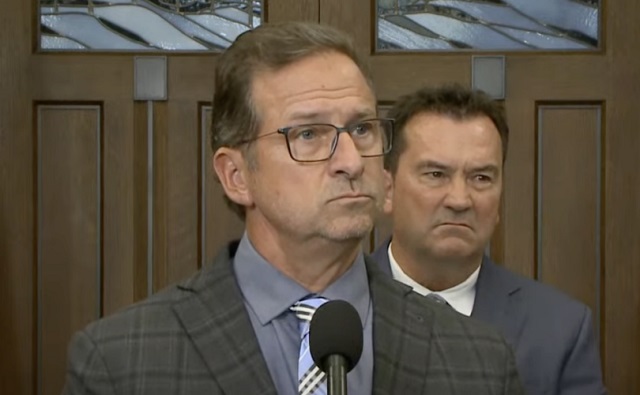Uncategorized
Rumored deal with Bloc Quebec party could keep Trudeau Liberals in power, stave off election

From LifeSiteNews
“The federal government does not have a mandate to bargain with Quebec separatists at the expense of Alberta, the West and the rest of the country”
The possibility of an early Canadian election may not come to fruition after Bloc Québécois leader Yves-Francois Blanchet hinted that an alliance between the separatist party and the Liberals under Justin Trudeau could become a reality.
Rumors began to swirl that a Bloc-Liberal deal could happen after Bloc House leader Alain Therrien said Sunday that the party’s “objectives remain the same, but the means to get there will be much easier.”
“We will negotiate and seek gains for Quebec … our balance of power has improved, that’s for sure,” he said, as reported by the Canadian Press.
Therrien made the comments in light of the possibility of a federal election taking place before fall 2025 after New Democratic Party leader Jagmeet Singh pulled his official support for Trudeau’s Liberals last week.
Late last month, Conservative Party leader Pierre Poilievre called on Singh to pull his support for Trudeau’s Liberals so that an election could be held.
Therrien also noted that the NDP pulling its support of the Trudeau Liberals has created a “window of opportunity” that his party may exploit. The Canadian Press reported that a person close to the Bloc party said directly that the NDP had in essence handed the party the balance of power.
As it stands now, the Bloc has 32 seats to the NDP’s 24, which is more than enough to prop up the Liberals, who have 154 seats.
As for Blanchet, he told the media on Monday that he was feeling “good” about his party’s newfound power. He then took a shot at Poilievre, saying he is more or less like Trudeau. “There are plenty of issues on which (Poilievre’s) in the same position as Justin Trudeau,” Blanchet said.
“Show us that you’re different, Justin Trudeau, apart from being against abortion, then we’ll see what you have to offer,” he said.
“If the Liberals don’t get into the frame of mind to let us make some very clear gains for Quebec, they’d better pump up the tires on their election truck right away.”
While most Conservative MPs are pro-life, Poilievre supports abortion and has a poor track record when it comes to life and family issues, with Campaign Life Coalition having given him a “red light” rating.
News of a possible Bloc-Liberal deal to keep Trudeau in power drew the immediate ire of Alberta Premier Danielle Smith.
“The federal government does not have a mandate to bargain with Quebec separatists at the expense of Alberta, the West and the rest of the country,” she wrote Monday on X. “If the Liberals go down this path, we need an election to be called immediately.”
On Tuesday, Blanchet responded to Smith’s comments to reporters by saying he found her remarks “funny,” adding that “Canadians are suddenly very interested in us.”
As for Trudeau, his woes continue to mount. LifeSiteNews recently reported how national elections campaign director for Canada’s federal Liberal Party announced he was stepping down because, according to sources close to the party, he does not think Trudeau can win a fourth consecutive election.
Recent polls show that the Conservatives under Poilievre would win a majority government in a landslide in an election held today. Singh’s NDP and Trudeau’s Liberals would lose a massive number of seats.
Uncategorized
Poilievre on 2025 Election Interference – Carney sill hasn’t fired Liberal MP in Chinese election interference scandal

From Conservative Party Communications
“Yes. He must be disqualified. I find it incredible that Mark Carney would allow someone to run for his party that called for a Canadian citizen to be handed over to a foreign government on a bounty, a foreign government that would almost certainly execute that Canadian citizen.
“Think about that for a second. We have a Liberal MP saying that a Canadian citizen should be handed over to a foreign dictatorship to get a bounty so that that citizen could be murdered. And Mark Carney says he should stay on as a candidate. What does that say about whether Mark Carney would protect Canadians?
“Mark Carney is deeply conflicted. Just in November, he went to Beijing and secured a quarter-billion-dollar loan for his company from a state-owned Chinese bank. He’s deeply compromised, and he will never stand up for Canada against any foreign regime. It is another reason why Mr. Carney must show us all his assets, all the money he owes, all the money that his companies owe to foreign hostile regimes. And this story might not be entirely the story of the bounty, and a Liberal MP calling for a Canadian to be handed over for execution to a foreign government might not be something that the everyday Canadian can relate to because it’s so outrageous. But I ask you this, if Mark Carney would allow his Liberal MP to make a comment like this, when would he ever protect Canada or Canadians against foreign hostility?
“He has never put Canada first, and that’s why we cannot have a fourth Liberal term. After the Lost Liberal Decade, our country is a playground for foreign interference. Our economy is weaker than ever before. Our people more divided. We need a change to put Canada first with a new government that will stand up for the security and economy of our citizens and take back control of our destiny. Let’s bring it home.”
Uncategorized
Canada Needs A Real Plan To Compete Globally

From the Frontier Centre for Public Policy
Ottawa’s ideological policies have left Canada vulnerable. Strategic action is needed now
As Canada navigates an increasingly complex geopolitical landscape, the next federal government must move beyond reflexive anti—Americanism regardless of its political leanings. Instead, Canada should prioritize national interests while avoiding unnecessary conflict and subservience.
The notion that Canada can stand alone is as misguided as the idea that it is only an economic appendage of the United States. Both perspectives have influenced policy in Ottawa at different times, leading to mistakes.
Rather than engaging in futile name-calling or trade disputes, Canada must take strategic steps to reinforce its autonomy. This approach requires a pragmatic view rooted in Realpolitik—recognizing global realities, mitigating risks, governing for the whole country, and seizing opportunities while abandoning failed ideologies.
However, if Washington continues to pursue protectionist measures, Canada must find effective ways to counteract the weakened position Ottawa has placed the country in over the past decade.
One key strategy is diversifying trade relationships, notably by expanding economic ties with emerging markets such as India and Southeast Asia. This will require repairing Canada’s strained relationship with India and regaining political respect in China.
Unlike past Liberal trade missions, which often prioritized ideological talking points over substance, Canada must negotiate deals that protect domestic industries rather than turning summits into platforms for moral posturing.
A more effective approach would be strengthening partnerships with countries that value Canadian resources instead of vilifying them under misguided environmental policies. Expand LNG exports to Europe and Asia and leverage Canada’s critical minerals sector to establish reciprocal supply chains with non-Western economies, reducing economic reliance on the U.S.
Decades of complacency have left Canada vulnerable to American influence over its resource sector. Foreign-funded environmental groups have weakened domestic energy production, handing U.S. industries a strategic advantage. Ottawa must counter this by ensuring Canadian energy is developed at home rather than allowing suppressed domestic production to benefit foreign competitors.
Likewise, a robust industrial policy—prioritizing mining, manufacturing, and agricultural resilience—could reduce dependence on U.S. and Chinese imports. This does not mean adopting European-style subsidies but rather eliminating excessive regulations that make Canadian businesses uncompetitive, including costly domestic carbon tariffs.
Another key vulnerability is Canada’s growing military dependence on the U.S. through NORAD and NATO. While alliances are essential, decades of underfunding and neglect have turned the Canadian Armed Forces into little more than a symbolic force. Canada must learn self-reliance and commit to serious investment in defence.
Increasing defence spending—not to meet NATO targets but to build deterrence—is essential. Ottawa must reform its outdated procurement processes and develop a domestic defence manufacturing base, reducing reliance on foreign arms deals.
Canada’s vast Arctic is also at risk. Without continued investment in northern sovereignty, Ottawa may find itself locked out of its own backyard by more assertive global powers.
For too long, Canada has relied on an economic model that prioritizes federal redistribution over wealth creation and productivity. A competitive tax regime—one that attracts investment instead of punishing success—is essential.
A capital gains tax hike might satisfy activists in Toronto, but it does little to attract investments and encourage economic growth. Likewise, Ottawa must abandon ideological green policies that threaten agri-food production, whether by overregulating farmers or ranchers. At the same time, it must address inefficiencies in supply management once and for all. Canada must be able to feed a growing world without unnecessary bureaucratic obstacles.
Ottawa must also create an environment where businesses can innovate and grow without excessive regulatory burdens. This includes eliminating interprovincial trade barriers that stifle commerce.
Similarly, Canada’s tech sector, long hindered by predatory regulations, should be freed from excessive government interference. Instead of suffocating innovation with compliance mandates, Ottawa should focus on deregulation while implementing stronger security measures for foreign tech firms operating in Canada.
Perhaps Ottawa’s greatest mistake is its knee-jerk reactions to American policies, made without a coherent long-term strategy. Performative trade disputes with Washington and symbolic grandstanding in multilateral organizations do little to advance Canada’s interests.
Instead of reacting emotionally, Canada must take proactive steps to secure its economic, resource, and defence future. That is the role of a responsible government.
History’s best strategists understood that one should never fight an opponent’s war but instead dictate the terms of engagement. Canada’s future does not depend on reacting to Washington’s policies—these are calculated strategies, not whims. Instead, Canada’s success will be determined by its ability to act in the interests of citizens in all regions of the country, and seeing the world as it is rather than how ideological narratives wish it to be.
Marco Navarro-Génie is the vice president of research at the Frontier Centre for Public Policy. With Barry Cooper, he is co-author of Canada’s COVID: The Story of a Pandemic Moral Panic (2023).
-

 Uncategorized2 days ago
Uncategorized2 days agoPoilievre on 2025 Election Interference – Carney sill hasn’t fired Liberal MP in Chinese election interference scandal
-

 2025 Federal Election1 day ago
2025 Federal Election1 day agoChinese Election Interference – NDP reaction to bounty on Conservative candidate
-

 Business2 days ago
Business2 days agoCuba has lost 24% of it’s population to emigration in the last 4 years
-

 2025 Federal Election2 days ago
2025 Federal Election2 days ago2025 Election Interference – CCP Bounty on Conservative Candidate – Carney Says Nothing
-

 2025 Federal Election14 hours ago
2025 Federal Election14 hours agoChina Election Interference – Parties Received Security Briefing Days Ago as SITE Monitors Threats to Conservative Candidate Joe Tay
-

 2025 Federal Election2 days ago
2025 Federal Election2 days ago2025 Federal Election Interference from China! Carney Pressed to Remove Liberal MP Over CCP Bounty Remark
-

 2025 Federal Election18 hours ago
2025 Federal Election18 hours agoHong Kong-Canadian Groups Demand PM Carney Drop Liberal Candidate Over “Bounty” Remark Supporting CCP Repression
-

 Aristotle Foundation2 days ago
Aristotle Foundation2 days agoCanada has the world’s MOST relaxed gender policy for minors





